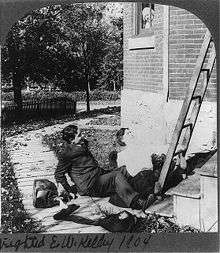Elopement
Elopement, colloquially speaking, is often used to refer to a marriage conducted in sudden and secretive fashion, usually involving a hurried flight away from one's place of residence together with one's beloved with the intention of getting married. Elopements, in which a couple runs away together and seeks the consent of their parents later, differ greatly from abductions and bride kidnapping in which there is no consent of the bride and/or groom.[1] To elope, most literally, means to run away and to not come back to the point of origin.[2]

Background
Today the term "elopement" is colloquially used for any marriage performed in haste, with a limited public engagement period or without a public engagement period. Some couples elope because they wish to avoid parental or religious objections. In addition, the term elopement is used in psychiatric hospitals to refer to a patient leaving the psychiatric unit without authorization.[3]
In some modern cases, the couple collude together to elope under the guise of a bride kidnapping, presenting their parents with a fait accompli. In most cases, however, the men who resort to capturing a wife are often of lower social status, because of poverty, disease, poor character or criminality.[4] They are sometimes deterred from legitimately seeking a wife because of the payment the woman's family expects, the bride price (not to be confused with a dowry, paid by the woman's family).[5]
Modern elopements
As millennials age, they are waiting longer to get married than previous generations. Further, 91% of millennials that are planning on future marriage would consider eloping, and three out of five previously married millennials would elope if they had to do it all over again.[6] The increase in searches for elopement photography ideas on Pinterest rose by 128% in 2019,[7] with other related terms like "elopements at city halls" and "elopements in forests" also seeing increases in volume.
Modern definition
Some view elopement as an intentionally small and intimate wedding experience which allows more emphasis to be placed on the commitment between the couple.[8]
Examples
United Kingdom
In England, a legal prerequisite of religious marriage is the "reading of the banns"—for the three Sundays prior to the intended date of the ceremony, the names of every couple intending marriage has to be read aloud by the priest(s) of their parish(es) of residence, or the posting of a 'Notice of Intent to Marry' in the registry office for civil ceremonies. The intention of this is to prevent bigamy or other unlawful marriages by giving fair warning to anybody who might have a legal right to object. In practice, however, it also gives warning to the couples' parents, who sometimes objected on purely personal grounds. To work around this law, it is necessary to get a special licence from the Archbishop of Canterbury—or to flee somewhere the law did not apply, across the border to Gretna Green, Scotland, for instance.
For civil marriages notices must be posted for 28 clear days, at the appropriate register office.[9]
Philippines
In the Philippines, elopement is called "tanan". Tanan is a long-standing practice in Filipino culture when a woman leaves her home without her parents' permission to live a life with her partner. Usually she will elope during the nighttime hours and is awaited by her lover nearby, who then takes her away to a location not of her origin. The next morning, the distraught parents are clueless to the whereabouts of their daughter. Tanan often occurs as a result of an impending arranged marriage or in defiance to parents' dislike of a preferred suitor.
Indonesia
In Indonesia, an elopement is considered as "kawin lari" or in literal translation, marriage on a run ("kawin", means marriage (slang), "lari" means running/fleeing). This happens if the groom or the bride didn't get the permission to get married with each other. As Indonesia is a religiously strict country, a couple couldn't get married without parent's (or next closest living relative) consent, hence, it is rarely practiced. Thus, most Indonesian couples who engage in elopement often end up marrying without their marriage recognized/registered by the government.
West Asia
In Assyrian society, elopement ("Jelawta" or "Jenawta") against parental request is very disreputable, and is rarely practised.[10] In the 19th and early 20th century, Assyrians had heavily guarded their females from abduction and also consensual elopement, when it came to their neighbours such as Kurds, Azeris and Turks, who would abduct Assyrian women and marry them, in some cases forcefully, where they would convert them to Islam.[11]
References
| Wikimedia Commons has media related to Elopement. |
- Ayres, Barbara "Bride Theft and Raiding for Wives in Cross-Cultural Perspective", Anthropological Quarterly, Vol. 47, No. 3, Kidnapping and Elopement as Alternative Systems of Marriage (Special Issue) (July 1974), p. 245
- Merriam-Webster Online Dictionary, elope.
- Psychiatric Elopement: Using Evidence to Examine Causative Factors and Preventative Measures
- See Stross, Tzeltal Marriage by Capture (Tzeltal culture); Scott, George (1986). The Migrants Without Mountains: The Sociocultural Adjustment Among the Lao Hmong Refugees In San Diego (PhD). University of California, San Diego. pp. 82–85. OCLC 34162755. (Hmong culture); Alex Rodriguez, Kidnapping a Bride Practice Embraced in Kyrgyzstan, Augusta Chronicle, 24 July 2005 (Kyrgyz culture);
- See Stross, Tzeltal Marriage by Capture, pp. 342–343; Smith, Craig S. (30 April 2005). "Abduction, Often Violent, a Kyrgyz Wedding Rite". The New York Times.
- Sims, Maddy (2019-08-29). "This Is the Wedding Trend Millennials Are Considering the Most in 2019". The Knot News. XO Group. Retrieved 2019-09-27.
- Alexander, Ella (2019-04-05). "Elopements are on the rise: why modern couples are running away from lavish weddings". Brides. Hearst Communications. Retrieved 2019-09-27.
- "Elope Definition". Adventure Instead. Colorado. 2019-03-16. Retrieved 2019-09-27.
- Giving notice of marriage or civil partnership, Liverpool.gov.uk
- Assyrian Rituals of Life-Cycle Events by Yoab Benjamin
- Hannibal Travis (20 July 2017). The Assyrian Genocide: Cultural and Political Legacies. Taylor & Francis. pp. 165–. ISBN 978-1-351-98025-8.